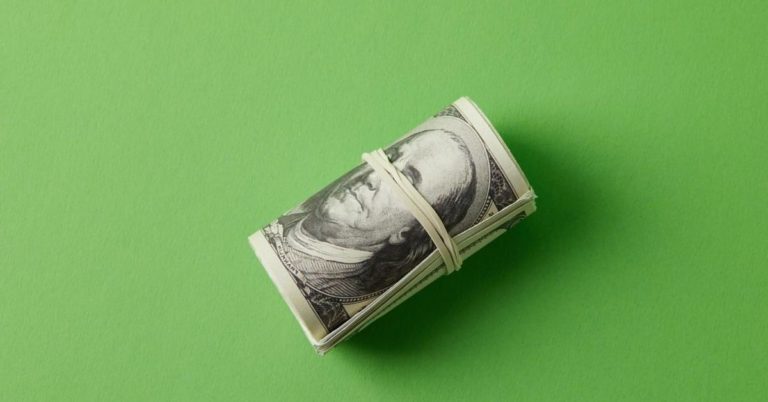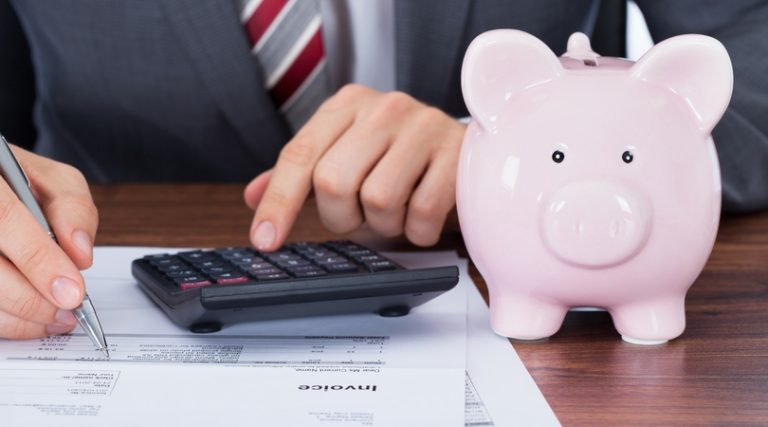How Combining Incomes Helped this Couple Pay off $47K in 6 Months

This article may contain references to some of our advertising partners. Should you click on these links, we may be compensated. For more about our advertising policies, read our full disclosure statement here.
This article was written by our guest Fo from Girl Talk with Fo. All thoughts expressed are solely those of the author. Enjoy!
Talking about money while dating can be a bit of a turn-off.
After all, when you’re love-smitten and googly-eyed, bringing up your debt and past money mistakes can certainly dampen the mood.
Now, imagine having over $78,000 in student loan debt hovering over your head. What exactly does that conversation look like over dinner?
As frightening as it may sound, that was the conversation I had with my husband while we were dating.
Having “The Talk”
Money definitely wasn’t the first thing on the agenda when my husband and I started dating. In fact, our first discussion about money wasn’t even planned.
As I remember it, we were sitting on my couch having one of our many conversations about life. Somehow, we managed to get on the topic of money. It was then that I learned that the man I was dating was completely debt free.
Not only had he paid off his student loans a few months after graduating, but he’d also paid for his car in cash.
As you might imagine, that was a tough act to follow. So, I gingerly shared that I had nearly $80,000 in student loan debt amassed over the course of five years. I suppose that the silver lining is that it was the only debt that I had accrued as a young adult.
Nonetheless, it was daunting.
Despite just dropping a huge financial bomb on my then boyfriend, I was surprised to find that I wasn’t met with judgment. Instead, he merely shared the book that led him to become debt free.
Though nothing changed in our relationship after that conversation, something changed in me. I had a more urgent desire to clean up my financial mess and become completely debt free.
Approaching Finances Together
Just over a year after having that initial conversation, we were engaged. This meant that a more serious conversation about money would ensue.
In the meantime, I was on fire paying off debt. Within that year, I had paid off my $24,000 undergraduate student loans and was beginning the journey of paying off the remaining $54,000 of graduate school debt.
Money talks between us became even more serious as we began to plan how we would pay for our wedding in cash and our future life together. We began to delve into things like:
- What our salaries were
- What our career aspirations were
- What lifestyle expectations and goals we had
- If we would loan money to family/friends
- If we would financially support family members
- Our thoughts on debt and the use of credit
More importantly, we talked about combining finances.
We knew that no matter how our opinions may have differed on any of the aforementioned topics, combining our finances would be the key to our success.
It was clear that we could go much further with a combined effort and income than we could apart. So, without question, the debt was no longer just my burden, but a shared feat for us to tackle.
Combining Incomes to Pay off Debt
After the dust settled from our wedding festivities, attacking the student loan debt was our first priority as a married couple. Our goal was to get rid of the debt as soon as possible so that we’d have the remainder of our lives to build wealth, live freely, and give.
Here’s what we did to pay off $47K in six months.
1. We made it a joint effort
Merely putting our money together in a joint bank account would not have been enough to pay off the debt as quickly as we did. Instead, there had to be combined and committed effort in working toward our goal.
Simply put, the student loan debt was no longer my debt, but it became our debt.
Though we didn’t play equal parts in acquiring it, we were committed to putting in equal effort to pay it off. We fully believed that once we said, “I do,” there was joint ownership of everything – including debt.
If you’re working to pay off debt with your spouse, relinquishing fault is critical for success. It’s not about who brought in the debt or caused it. Instead, it’s about working together to get rid of it for good!
2. We combined finances
In order for us to get rid of the remaining debt, we knew that we needed more money to throw at it. That’s where combining our incomes became vital.
Having two incomes available to put toward our debt gave us the cash flow we needed to pay it off faster.
To do this, we opened joint bank accounts and updated our direct deposits with our employers to have our paychecks go into the new accounts.
In addition, we combined our bills. Doing so enabled us to make one payment for each of our household expenses, like our cell phone bill and Amazon Prime subscription.
Any money that we earned, even from side hustles, was also added to the joint accounts and put toward paying off our debt. This included tax refunds, bonuses, and monetary gifts.
Combining finances in marriage can be hard, but it enables you to go so much further. Remember, “Two heads are better than one.”
3. We developed a debt repayment plan
The most important aspect of paying off our debt was creating a plan. After all, a goal without a plan is just a wish.
I must share that our debt free journey took place before the popularity of debt payoff apps. So, to create our repayment plan, we used an old school Excel spreadsheet. Ultimately, we created an amortization schedule for the debt to determine when it would be paid off at the rate we were going.
Each pay period we’d look at the plan to see how we were trending toward that date. It not only gave us a goal to work toward, but it gave us clear instructions on what we needed to do to get out of debt faster.
Additionally, we created a zero-based budget to account for every penny that came into our account.
Quite honestly, we didn’t expect or plan for the debt to be paid off in six months. Yet, there’s something about creating a plan that makes you work harder to exceed your goal.
4. Reduced expenses
The great thing about the amortization schedule that we created is that we could see the impact of every extra dime that we applied to our debt. We saw that the more we could reduce our expenses in the budget, the quicker the debt would be paid off.
Although we had combined incomes and could have increased our lifestyle and spending, we didn’t. Instead, we opted for a cheaper, slightly older apartment that was furnished by our items from college and early adulthood. We cut back on eating out and prepared our meals instead. We also decided not to get cable (and still don’t have it to this day).
Though our lifestyle was a far cry from that of a minimalist, we still removed those unnecessary expenses that can eat away at your discretionary income.
Our Final Payment
We made the final payment on our debt in October of 2016 – just six months after getting married.
Admittedly, it was an anticlimactic moment hitting that pay button for the last time. Though we were extremely excited, the feeling of relief outweighed it all. We had just taken a huge financial burden out of our marriage.
It wasn’t until the next pay period when we saw the money remain in our bank account that it finally hit.
We were debt free!
Being able to pay off $47K in six months would have been impossible if not for combining our incomes and working together. It not only allowed us to start off our marriage in a great position financially, but it taught us an invaluable lesson of working together when it comes to money.
Today, we’re just a few years shy of paying off our first home using the same methods mentioned and we wouldn’t do it any other way.
Have you ever paid off a huge debt? Tell us how you did it in the comments!
Faneisha “Fo” Alexander is the founder of the Girl Talk with Fo blog and podcast, where she shares personal finance tips for millennial women. She leverages her own personal experiences to teach others how to get out of debt, build wealth, and create the life that they desire. She is the author of the book, Dump Debt & Build Bank: The Everyday Chick’s Guide to Money and a Certified Financial Education Instructor.







Great tips to become debt-free. Having a foresight plan and making moves according to the plan is must for those who are striving to become debt-free.Thanks for a great article…
Thanks Sivah! A plan is definitely necessary.
We have had the honor of paying off over $200,000 in debt over the last four years. The bulk of the payoff was in the last two years though, when we really decided to take the debt payoff seriously. We paid all this off while I was in grad school and working only part-time. So, after paying off a rental and working towards paying off the second rental now ($28K more to go yay!) we hope to retire early, or at least build extra security into our retirement plans. We are thankful to the Dave Ramsey course which really lit a fire under us. Now, it’s just a lifestyle and takes less effort than before. Congrats on your payoff!
That’s awesome!!! Congrats! What an accomplishment.